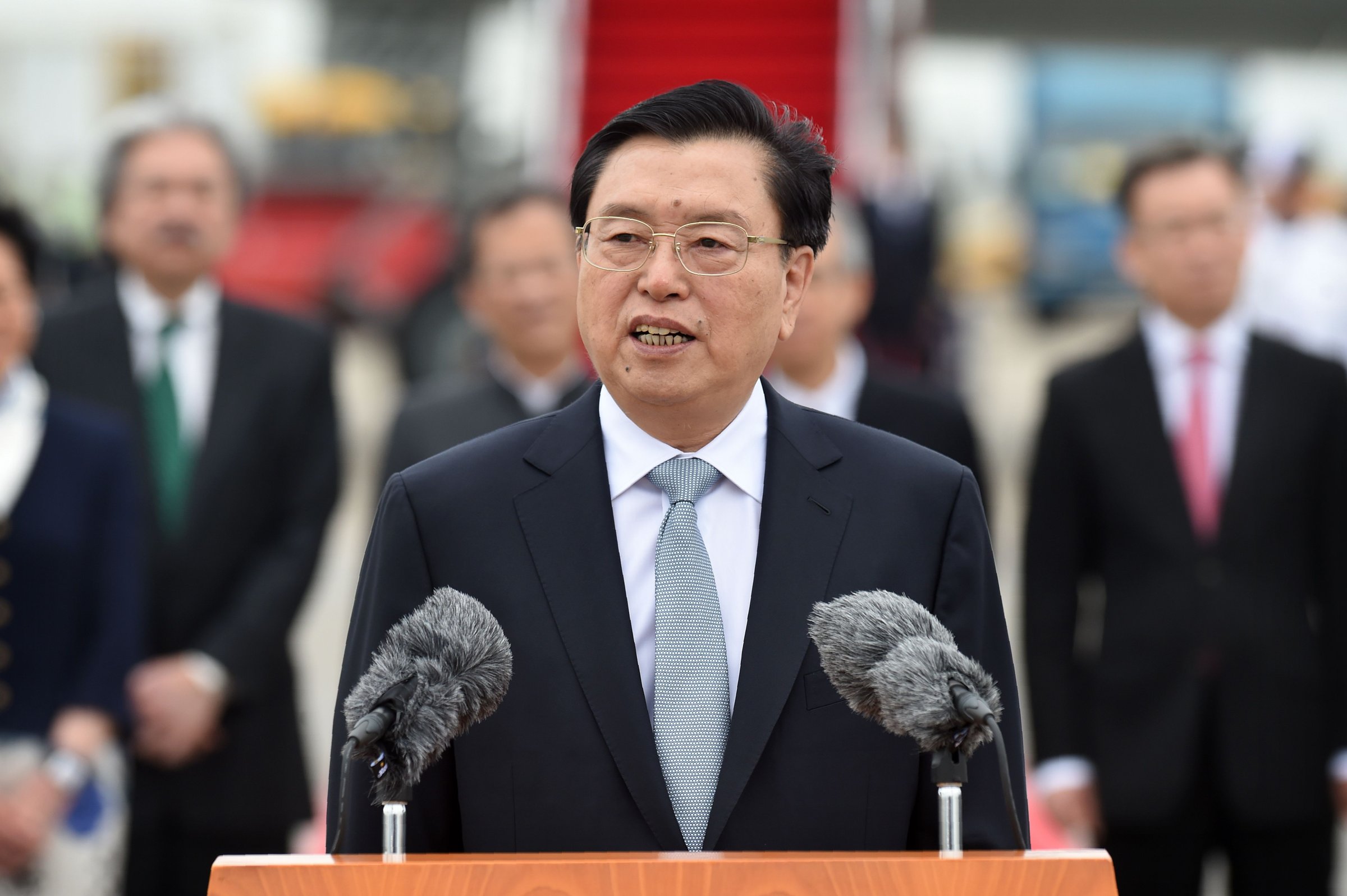
A heavy security presence effectively quashed plans by democracy activists to gather in the streets of Hong Kong on Tuesday to decry the arrival of senior Chinese official Zhang Dejiang.
“We are just protesters, but they’re treating us like terrorists,” 22-year-old political activist Keith Chan said, standing outside of a police barricade manned by several officers. “The police are so afraid of Zhang Dejiang seeing us protest.”
Zhang is the chairman of China’s rubber-stamp legislature, the National People’s Congress, and the first top party leader to visit Hong Kong since 2014’s pro-democracy protests. He landed in the Special Administrative Region (SAR) just before noon local time for a three-day visit.
He struck a conciliatory tone on arrival. Local media reported that he said he had “some bonding to do with Hong Kong” and that he pledged to listen to “all sectors” of society on issues of governance affecting the territory.
However, his visit comes at a time when many Hong Kongers, particularly the younger generation, feel that meaningful autonomy under Chinese sovereignty — the so-called “one country, two systems” principle — cannot be achieved.
The foiled protest, one of several scheduled for the coming days, was to have been spearheaded by fledgling political party Demosistō. Headed by youthful activist Joshua Wong, it emerged last month from the ashes of the Umbrella Revolution to put forward a more audacious demand: the right to self-determination.
Many in Hong Kong say that the system has failed, pointing to the city’s inability to choose its own leader and to Beijing’s growing encroachment — dramatized by the dubious disappearance of five local publishers late last year. The only viable alternative, some young people now say, is establishing Hong Kong as an independent territory, free of the mainland’s interference.
Some legal experts in China have condemned Hong Kong’s independence movement as seditious, but this has not fazed political activists here. In preparation for Zhang’s visit, local authorities braced themselves for popular unrest, assembling what the South China Morning Post described as the police’s “biggest security operation yet.”
Over 6,000 officers have been assigned to protect Zhang; the Grand Hyatt in the bustling Wan Chai district, where he is staying, is a “restricted zone.” Workers have even been gluing down paving stones so that demonstrators cannot break them up to use as missiles. Local media reports that any drones in the area will have their frequencies jammed.
Around the time of Zhang’s arrival in Wan Chai, security enforcement was almost draconian. Two young political icons, Demosistō president Nathan Law and well-known agitator Derek Lam, were both accosted by police officers for venturing beyond designated checkpoint zones; Law was at one point slammed to the ground by officers.
“This is why we need to protest,” Law told TIME across the street from the Grand Hyatt, shortly after Zhang arrived. “The Communist Party and the Hong Kong government are trying to create a fake picture of Hong Kong being very peaceful, where no one is voicing their opinion against Zhang Dejiang and China.”
He said that that they were attempting to plan further protests away from officially designated protest areas, which he said were intentionally designed to be out of the public view.
Democracy activists were at least able to unfurl a giant banner reading “I Want Genuine Universal Suffrage” on the city’s Beacon Hill on Tuesday, evading police who had camped in the area overnight in an attempt to prevent such an occurrence. A banner reading “An End to Chinese Communist One-Party Rule” was also hung over the main highway leading from the airport to the city.
More Must-Reads From TIME
- The 100 Most Influential People of 2024
- Coco Gauff Is Playing for Herself Now
- Scenes From Pro-Palestinian Encampments Across U.S. Universities
- 6 Compliments That Land Every Time
- If You're Dating Right Now , You're Brave: Column
- The AI That Could Heal a Divided Internet
- Fallout Is a Brilliant Model for the Future of Video Game Adaptations
- Want Weekly Recs on What to Watch, Read, and More? Sign Up for Worth Your Time
Contact us at letters@time.com